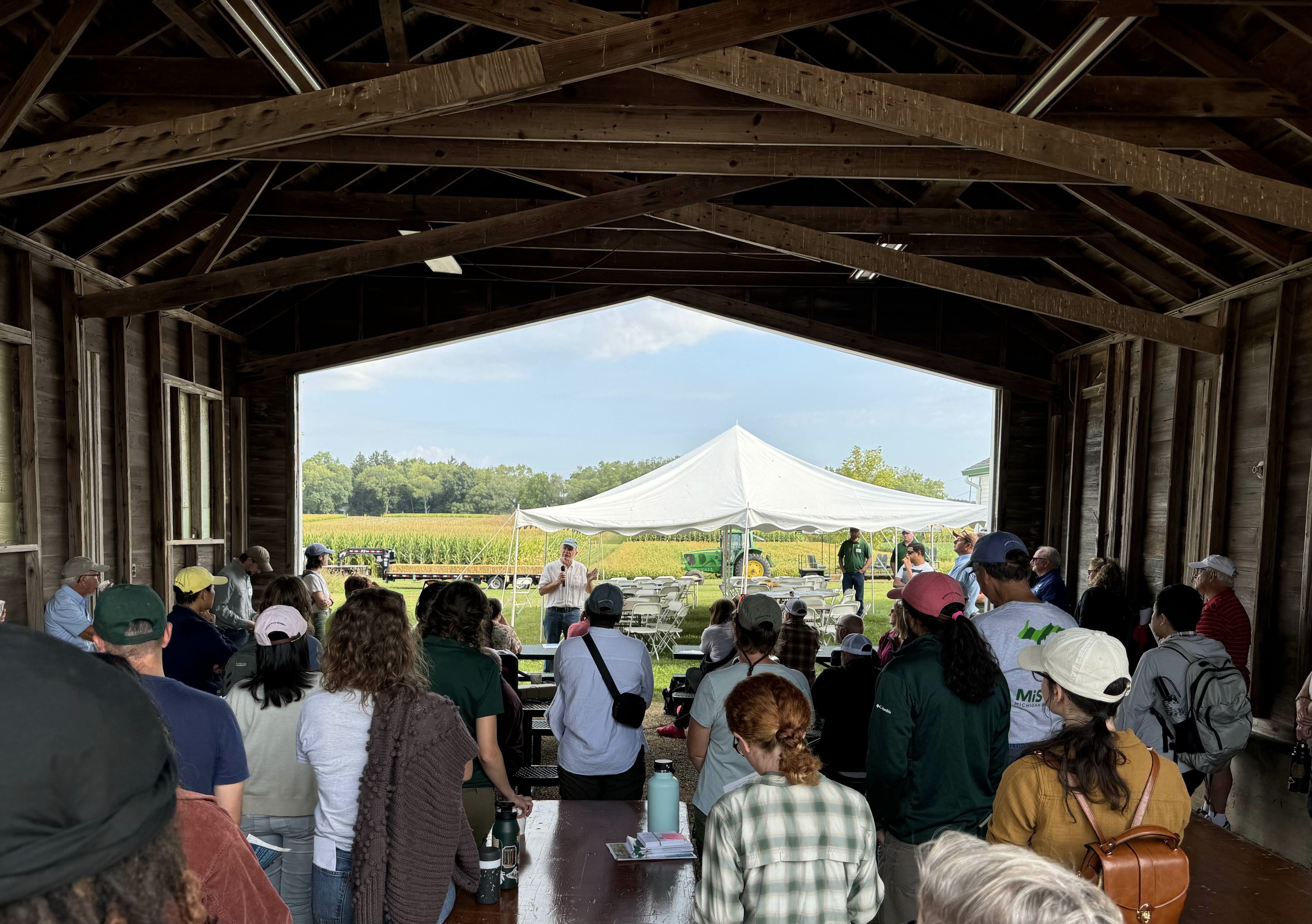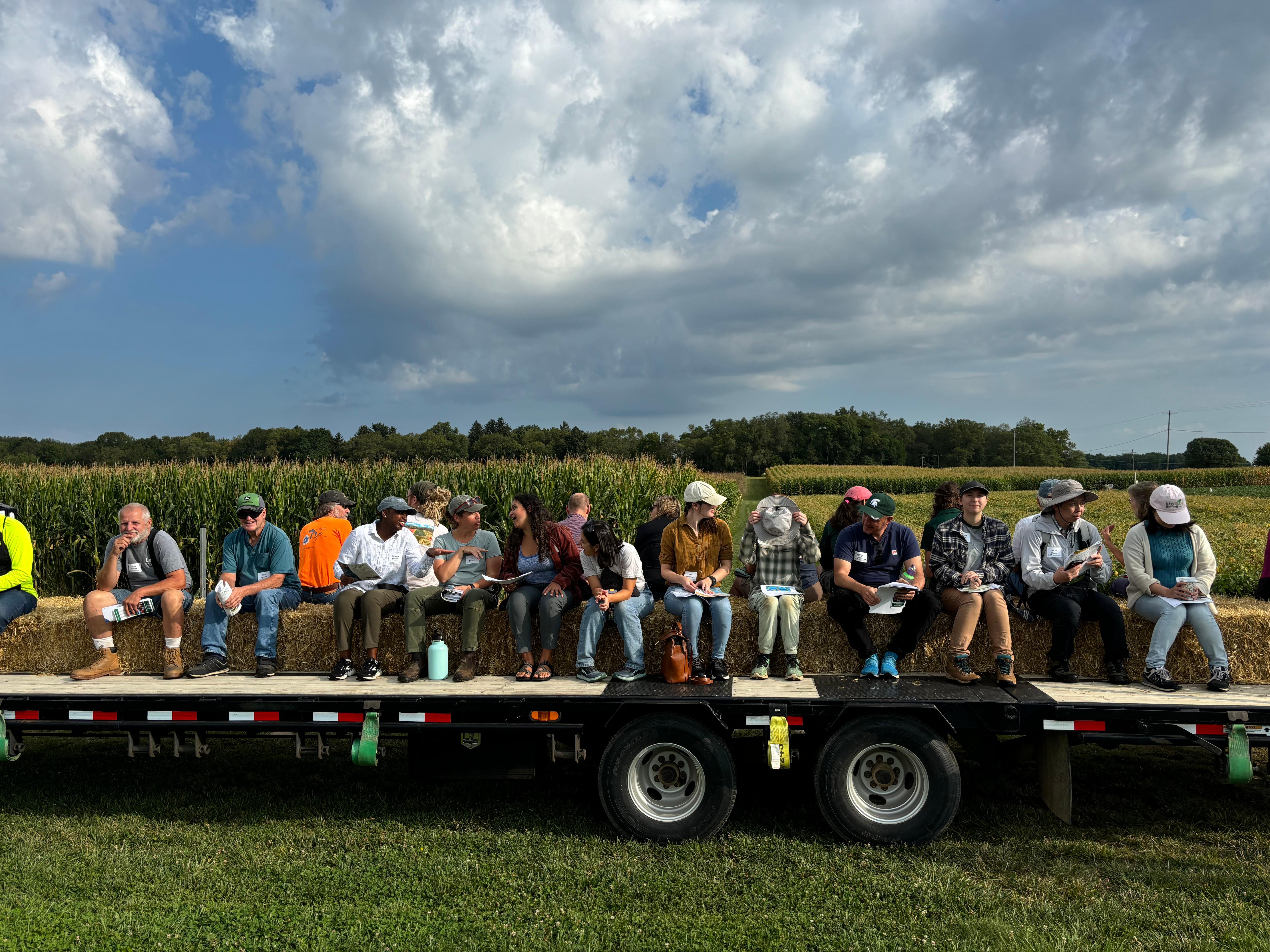Sustainable agricultural practices and findings spotlighted at the second annual KBS LTAR field day
The second annual KBS LTAR field day showcased early agronomic and ecological changes in fields managed with advanced conservation strategies while also offering practical tips to make these practices work.

On Thursday, Sept. 5, 2024, over 80 attendees, including researchers, farmers and agricultural professionals, gathered at the Kellogg Biological Station Long-Term Agroecosystem Research (KBS LTAR) site for the second annual field day. The event showcased early agronomic and ecological changes in fields managed with advanced conservation strategies, as demonstrated in the aspirational cropping systems, including a five-crop rotation, no-till farming, cover crops and precision agriculture technologies. Presenters also provided practical tips about how to make these practices work. Attendees were introduced to the event by Phil Robertson, director of the KBS LTAR, before beginning a tour of the plots with the following stops:
- Hannah Burrack and DeShae Dillard discussed arthropod monitoring, focusing on the role of beneficial insects and pest control in sustainable farming, especially when practices like no-till pose significant challenges to controlling slug populations. Following this, Nick Haddad and Annabelle McCarthy shared insights on prairie systems, their importance for pollinators and early findings on beneficial insect attraction to prairie strips.
- Christine Sprunger and Tvisha Martin emphasized the critical role healthy soils play in supporting resilient cropping systems, as well as how nematode biodiversity can be an early indicator of soil health changes with management. They also described a newly funded project that will work to provide regionally relevant soil health metrics across Michigan through a free soil health tests for farmers.
- Brook Wilke and Stacey VanderWulp explored how the different cropping system treatments, water management strategies and water quality measurements are taken at the site. After a rapid rainfall in May 2024, the conventionally managed and tilled system had significantly greater soil erosion than the aspirational system with no-till and continuous cover.
- Phil Robertson explained how greenhouse gases and carbon sequestration in the system are measured and offered insights on how agriculture can mitigate climate change.
- Sandy Marquart-Pyatt and Tayler Ulbrich discussed how social science played a role in sustainable agriculture research at the site. Specifically, findings from an ongoing Panel Farmer Survey report on current practices in field crop systems and insights on farmer’s perceptions of soil health.
- Christine Charles discussed the economics of yield and profitability of the LTAR series of practices. In comparing the two systems, higher yields don’t necessarily lead to higher profits in the conventional rotation. However, wheat, canola and forage struggled to be profitable in 2023 in the aspirational treatment.
- Manni Singh presented on strategies for how to make wheat cultivation more profitable. He described that wheat has incredible benefit to agricultural systems and there are opportunities to improve profitability with planting innovations and improvements to agronomic management.
- Jason Stegink, the crop advisor for the KBS LTAR, wrapped up the event with agronomic insights from the LTAR site from the past year, especially highlighting pest concerns and management strategies for such a complex system.
.jpg?language_id=1)
Attendees found information about greenhouse gas research and prairie strips especially informative, though each session received praise for being helpful and insightful. Attendees also overwhelmingly agreed that the KBS LTAR initiatives have helped create new/deeper relationships with others in this field and have produced useful information for their work. This field day highlighted the breadth of research taking place at KBS LTAR, underscoring the critical role of interdisciplinary approaches in shaping the future of farming.
Save the date for next year’s KBS LTAR Field Day – Thursday, Sept. 4, 2025.
You can read more and listen to interviews with field day speakers at the links below:
- MSU studies what could become crop production norms
- A photo tour of the Kellogg Biological Station LTAR Field Day in Hickory Corners, Michigan
- Choppers are moving in on corn silage harvest
- Soybeans show promise at start of long-term ecological study




 Print
Print Email
Email
